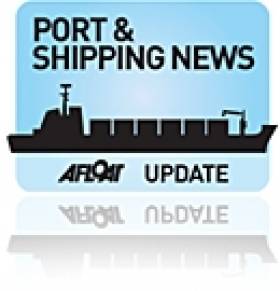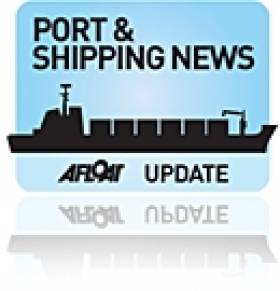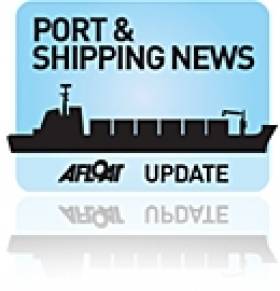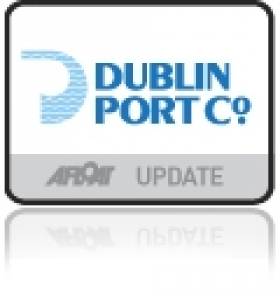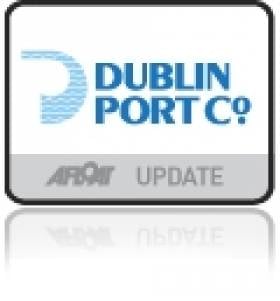Displaying items by tag: Hebble Sand
Drogheda Port Company Representatives to be Asked to Meet Louth Councillors Over former Dredger Hebble Sand
Drogheda Port Company’s Chief Executive and the Chair of its Board are to be invited to attend a meeting of Louth County Council on the future of the former dredger, Hebble Sand which remains idle in the centre of the port town.
The 757-ton Hebble Sand has been berthed at the town’s North Quay for around a decade. The dredger which is now more than 60 years old, used to operate as a self-propelled grab-hopper dredger out of neighbouring Dundalk but originally had a career in the UK.
Local Independent councillor, Kevin Callan made the proposal at the Louth County Council’s monthly meeting.
Cllr Callan wants to raise the issue of the 47m Hebble Sand that partially sank while berthed in the River Boyne in 2022 but was subsequently re-floated.
He added that although action was taken, the Hebble Sand has not been removed, and members of the Borough District of Drogheda have been unable to get a representative of the Drogheda Port Company to attend their own monthly meeting.
LMFM News which reports on the story, also has an audio clip from the Councillor.
Afloat adds that Hebble Sand during its Irish career, carried out numerous contract assignments in ports throughout the island of Ireland.
Among the more high-profile projects was in the preparation prior to the installation in Dublin of the Samuel Beckett swing bridge which arrived by barge from The Netherlands and works in Belfast's Queens Quay on the Lagan close to the city-centre.
At more than half a century old, the Hebble Sand built in 1963 by Richard (Shipbuilders) of Lowestoft, England, who built the vessel for British Dredging. The grab-hopper was later used by Associated British Ports (ABP) to serve a network of ports.
Former Dredger at Drogheda Port with Diesel Onboard to be Removed Before Scrappage
A former dredger, Hebble Sand which in September was refloated in Drogheda Port from where it has been derelict for almost a decade, is to have the diesel it is carrying removed in the coming week.
According to Alison Comyn's report in the Drogheda Independent, the removal of diesel follows a written request from the Mayor of Drogheda, Cllr Michelle Hall, who received a report from Louth County Council's Environmental Compliance Officer about the partial sinking and diesel spillage from the veteran vessel that originally began a career in the UK.
The report on the almost 60-year-old grab-hopper dredger that also served Irish Sea ports, stated that there was no evidence of an oil leak found but some residual diesel was discharged.
The diesel had mixed with the low tide and that booms had been placed around the hull of the 757-tonne dredger, this to prevent further dispersion in the Co. Louth port as per requirements in estuarine waters.
In addition the report found no evidence of impact to fish nor to wildlife arising from the Hebble Sand that is berthed alongside Merchant's Quay on the north bank of the Boyne from where as Afloat.ie reported in 2014 was part of the Irish Maritime Festival.
More information was also given of the ongoing works by Drogheda Port Authority.
Click here for further reading on the story.
Hopper-Dredger Hebble Sand Remains In Drogheda Port Since Dramatic Refloating
Since a dramatic rescue in Drogheda Port with the re-floating of the hopper-dredger Hebble Sand from sinking in the River Boyne recently, no repairs have been carried out, writes the Drogheda Independent.
In addition there is no indication given as to when the almost 60 year-old dredger will be moved.
Fergus O’Dowd, the local T.D. has received correspondence from Louth County Council's environmental department, who have been overseeing developments in the process.
“What I have been told is, to date, no repairs have been made to the boat. They are currently monitoring the level of water in the boat to make sure the boat stays afloat and upright,” said Deputy O’Dowd.
“Tanks and pumps are due down during the week to remove diesel fuel from the vessel fuel tank and empty bilges. The contractor was on-site yesterday to make an initial assessment of equipment required. Once this is removed the repairs will be carried out with the aid of divers to make the vessel safe”.
The installation of double booms at the river berth still remain in place to contain residual diesel.
For more on the operation (click here) on the dredger that Afloat adds was built in 1963 to originally serve UK ports.
#FORMER DUNDALK DREDGER – Hebble Sand (1963/757grt), a grab-hopper dredger which has remained in Dublin Port for more than one year departed Dublin Port and is currently heading for Campbeltown, on the Mull of Kintyre Peninsula, writes Jehan Ashmore.
As previously reported on Afloat.ie, the veteran vessel was purchased last October by Northern Ireland based Abco Marine Ltd. The marine-plant and engineering equipment company is headquartered in Lisburn. Prior to then the former Dundalk Port Company owned dredger had remained laid-up since her repositioning voyage from the Louth port in July of 2011.
The change of port, followed the transfer of the Dundalk Port Company assets, liabilities and operations to Dublin Port Company by an order of statutory instruments, which saw the capital port divest in the business of dredging.
Since then for the majority of her time spent in the port, she had moored in Alexandra Basin West, except for a short spell spent as reported at the nearby dry-dock facility after Abco brought the ship.
Yesterday she made the short passage across the basin to the river-berth alongside Ocean Pier in readiness for her first repositioning voyage under her new owners, in a career that has so far spanned just short of half a century.
This timeframe is pretty good going for a vessel, particularly engaged in the rough and tumble work of a humble dredger which remains in excellent condition. So her career continues and remarkably still retaining her original name since her launching from Richard (Shipbuilders) of Lowestoft who built her for British Dredging.
In this photo-link of the vessel in recent years, she is seen alongside Sir John Rogerson's Quay, Dublin Port, where she carried site preparatory work prior to the installation of the Samuel Beckett swing-bridge, which was towed on a barge from the Netherlands.
Note to the left of the small ship can be seen the gable-end of the last dockland warehouse sheds that were built on both sides of the campshires that line the Liffey, in an area now named the 'Docklands' quarter of the port.
With cargoships long gone, including the famous Guinness stout-tankers, the sheds historically represent the last such buildings in what was the 'real' docklands close to the inner-city.
One of the two-adjoining sheds (built in the 1880's) was occupied by BJ Marine and now the river-fronted 'Nama' property, formerly owned by the DDDA, have recently been placed on the market for sale or to let.
#FORMER DUNDALK DREDGER – The former Dundalk Port Company owned dredger Hebble Sand (1963/757grt) departed the dry-dock in Dublin Port last week in readiness for her new owners Abco Marine Ltd, writes Jehan Ashmore.
Last October the vessel was sold by Dublin Port Company to Abco. The marine plant company based in Hillsborough Co. Down specialises in support services in the construction, engineering and dredging projects in Northern Ireland, Scotland and the Isle of Man.
The self-propelled grab-hopper dredger currently remains berthed at Alexandra Basin in Dublin Port, awaiting her delivery voyage. Despite nearing half a century, the veteran vessel remains in excellent condition considering the rough and tumble associated with dredging.
She last sailed into Dublin Port in July last year following the transfer of the Dundalk Port Company assets, liabilities and operations to Dublin Port Company by an order of statutory instruments.
Against this background, Dublin Port Company decided to divest in dredging business resulting in placing the Dundalk registered ship on the market for sale. The small ship at first glance resembles the last of the Guinness ships, The Lady Patricia and the world's first custom built liquid-bulk (pumped on board) stout tanker Miranda Guinness.
Unfortunately these vessels with such strong and unique histories were not saved from the breakers-torch whereas the humble Hebble Sand continues as a working ship. She is a testament to her builders Richard (Shipbuilders) of Lowestoft who built her for British Dredging and subsequent owners spanning a career at a shave off fifty years.
Former Dutch Dredger on the Boyne
#PORTS & SHIPPING- Berthed at the Steam Packet Quay, Drogheda is the suction-trailer dredger Lough Foyle (1979/868grt) which is on contract work with the Drogheda Port Company, writes Jehan Ashmore.
Following the sale last month of Hebble Sand, as previously reported on Afloat.ie (clcik HERE), the Lough Foyle (PHOTO) is now the only port-owned dredger on the island of Ireland. The Londonderry Port & Harbour Commissioners (LPHC) purchased the vessel from Dutch interests in 2009. She was originally the Saeftinge, built in 1979 at the Van Goor Scheepswerf in Monnickendam.
Since her introduction she has performed previous dredging operations to include the Drogheda Bar leading into the Co. Louth port. Her most recent contract was in Waterford Estuary, from where she arrived from on Tuesday after an overnight voyage.
In addition she has worked at the new Stena Line ferryport terminal at Loch Ryan, Cairnryan, to see related report click HERE. The Scottish ferryport is due to be officially opened tomorrow, to read more including the newly introduced 'Superfast' sisters click HERE.
Former Dundalk Dredger Sold in Dublin Port
#DUBLIN PORT-The former Dundalk Port Company grab-hopper dredger Hebble Sand (1963/757grt), which has been laid-up in Dublin since last Summer, was sold to new owners a month ago, writes Jehan Ashmore.
She remains berthed at the Bulk Jetty, Alexandra Basin, where she arrived from the Co. Louth port on 14 July, two days after the assets, liabilities and operations of Dundalk Port Company were transferred to Dublin Port Company by an order of statutory instrument. Against this background, Dublin Port Company decided to divest in the business of dredging resulting in placing the veteran vessel for sale.
During her career in Drogheda, she was the only dredger to be operated and owned by a port company apart from the suction-trailer dredger Lough Foyle (1979/868grt) operated by Londonderry Port & Harbour Commissioners.
Hebble Sand, registered in Dundalk has retained her original name since her launch from Richard (Shipbuilders) of Lowestoft for British Dredging. She has been kept in good condition considering a career nearing five decades. To read some of her last contracts undetaken outside her homeport, click HERE.
From a distance some people have mistaken Hebble Sand (PHOTO) to the last of the 'Guinness ships, as she bores a resemblance to the final custom-built stout tanker Miranda Guinness ( PHOTO), taken on her farewell sailing. The vessels shared a similar red funnel and black funnel, a roomy sized superstructure painted in cream above and a dark blue hull. To read more about the last of the brewery tanker-fleet click HERE.
Dublin Port Tug Trio For Sale
The smallest of the tugs for sale is the 17-tonnes bollard pull Ben Eadar (1972/198grt) which was built by Richard Dunston (Hessle) Ltd. She is berthed elsewhere in the port alongside the former Dundalk Port Company owned dredger Hebble Sand, which too has been recently put up for sale. For more information about the grab-hopper dredger click HERE.
Ben Eadar was decommissioned in 2009 and her 35-tonnes bollard-pull fleetmates Cluain Tarbh (1991/268grt) built by McTay Marine of Bromborough and Deilginis (1996/335grt) remained in service until late last year.
Of the trio Deilginis is the last tug commissioned by the Dublin Port & Docks Board (DP&DB) and the 30m tug is also the last to carry a traditional naming theme based on Dublin Bay coastal suburbs spelt in Irish. Deilginis is the Irish for Dalkey, Cluain Tarbh is for Clontarf and Ben Eadar is a translation for Howth.
Deilginis was launched from Astilleros Zamakona S.A. in Bilbao, the same Spanish shipyard that was commissioned by the Dublin Port Company to build two 50-tonnes bollard pull tractor tug sisters. The first newbuild Shackleton entered service late last year and she was followed by Beaufort in early 2010. In March of that year the tugs that cost €6m each to build were officially named in a joint ceremony.
- Dublin Bay
- Clontarf
- Dublin Port Company
- Dundalk Port Company
- howth
- dalkey
- Port of Dublin
- Ports and Shipping News
- Dublin Port Tugs
- Deilginis
- Cluain Tarbh
- Ben Eadar
- Dublin Port & Docks Board
- Hebble Sand
- Dredger for Sale
- VoithSchneider trator tugs
- EastLink bridge
- North Wall Extension
- Dublin Bay suburbs
- McTay Marine
- Richard Dunston (Hessle) Ltd
- Astilleros Zamakoza S.A. Bilbao


























